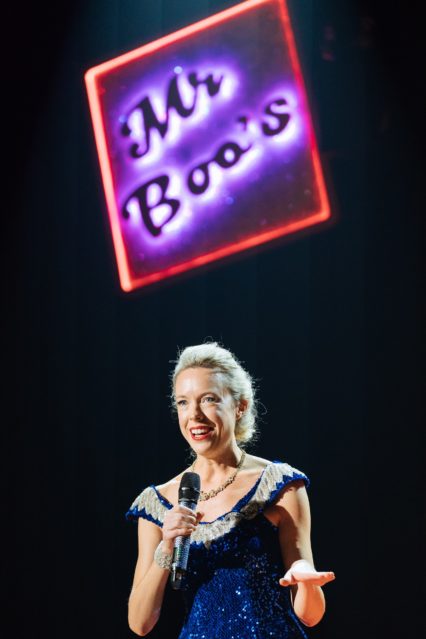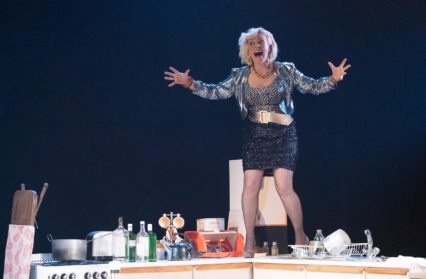Jim Cartwright’s Olivier Award-winning musical comedy, The Rise and Fall of Little Voice, is not only rib-crackingly funny, but is also a heart-wrenching exploration of family, the power of music, and the dichotomy of extra- and introversion. The play was first performed at the Royal National Theatre and was later released as a film starring Jane Horrocks as Little Voice and Brenda Blethyn as her mother, Mari Hoff. This most recent production at Theatr Clwyd, directed by Kate Wasserberg, beautifully depicts the vast gulf between those who speak and never listen and those who listen but are never heard.
 In a small Northern town during the mid-80s a mother and daughter co-exist in a house that’s falling down around them. The daughter, appropriately nicknamed Little Voice or LV, rarely speaks, while her mother, Mari, never seems to stop. LV only comes into her own through the love of music that her late father gave her. A local ‘artist manager’, Ray Say, believes he has found the next best thing, when he hears LV singing with Judy Garland’s voice during a power outage. But LV does not want to sing. The play sensitively depicts what it is to be surrounded by people who will not listen, and Catrin Aaron perfectly captures both LV’s fragility and her quiet strength.
In a small Northern town during the mid-80s a mother and daughter co-exist in a house that’s falling down around them. The daughter, appropriately nicknamed Little Voice or LV, rarely speaks, while her mother, Mari, never seems to stop. LV only comes into her own through the love of music that her late father gave her. A local ‘artist manager’, Ray Say, believes he has found the next best thing, when he hears LV singing with Judy Garland’s voice during a power outage. But LV does not want to sing. The play sensitively depicts what it is to be surrounded by people who will not listen, and Catrin Aaron perfectly captures both LV’s fragility and her quiet strength.
Theatr Clwyd’s set sees LV held away from the stage in her bedroom. This distance from the main action on stage emphasises the difference between LV and the other people in her life; she is trapped in her cage by her own fear and her mother’s disregard. When the set shifts LV’s cage becomes a stage, though it is no less confining for its promise of freedom. The production’s play with sound, light, and space all serve to demonstrate LV’s journey from a quiet songbird to a free and flying lark. The casting for this performance is sublime. Every actor portrays their role with alacrity and talent, each clearly defining the two sides of their character. Even Victoria John’s character, Sadie, who says very little beyond ‘OK’ and other one-line responses, is a character of depth who really relates to LV and provides a level of comfort when Mari is too wrapped up in her own life to care.
Cartwright’s play, while extremely comic for a vast proportion, does have an dark side to it. With subtle shifts in language and slips in control, the play exposes the seedier side of a man trying to help his girlfriend’s daughter pay tribute to her father, and shows us a money-hungry bully who won’t take no for an answer. It takes the loving, if gregarious, mother, and makes her a selfish woman who drove her husband to an early grave. The darker sides of these characters are explored in the piece with as much aptitude as the comical, and are perhaps more poignant for their root in such humourous type-roles.
This play was a stunning success for Theatr Clwyd. Aaron’s beautiful renditions of classic songs were indistinguishable from the originals, the most moving being her performance of Edith Piaf’s ‘Non, je ne regrette rien’. Overall, a resounding triumph.
(Directed by Kate Wasserberg; Designed by Amy Jane Cook; Photography by Manuel Harlan)











